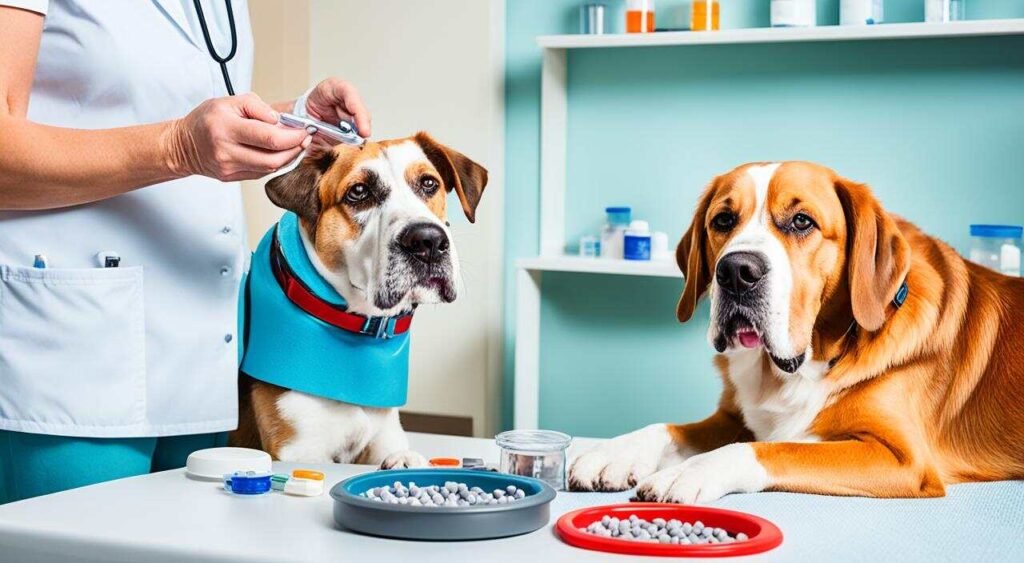Watching your dog get sick is tough. But, knowing how to care for them can make a big difference. We’re here to give you the best advice and tips. This includes spotting if they’re sick, giving basic care, giving medicine right, tracking how they’re doing, making a comfy place for them to get better, and dealing with common dog health problems.
Key Takeaways:
- Recognize signs of illness in your dog.
- Provide basic care for your sick dog, including hydration and nutrition.
- Administer medications as directed by your vet.
- Monitor your dog’s progress and keep a log of symptoms.
- Create a comfortable and soothing environment for your sick dog’s recovery.
Recognizing Signs of Illness in Dogs
Dogs can’t tell us when they feel sick. So, it’s important for pet owners to watch for signs of illness. Seeing these signs early helps keep your dog healthy.
What are some common signs that a dog is unwell?
- Changes in appetite or water consumption
- Lethargy or lack of energy
- Vomiting or diarrhea
- Unexplained weight loss or gain
- Coughing or sneezing
- Sudden changes in behavior or mood
If your dog is showing any of these signs, it’s time to call the vet. They will diagnose the issue and make a treatment plan.
Providing Basic Care for a Sick Dog
After your vet diagnoses your dog, basic care is key to their recovery. Here’s what you need to do:
- Maintaining Hydration: Always keep fresh water available. It’s vital for your dog’s health and recovery to stay hydrated.
- Nutritious Diet: Stick to the diet your vet suggests. The right nutrition is critical for your dog to get better.
- Comfortable Resting Area: Make a quiet place for your dog to relax. Add a soft bed or blankets to help them feel safe and comfortable.
- Emotional Support: Give your dog lots of love and attention. Pet them gently and let them know everything will be okay.
Every dog’s illness and healing is different. Always ask your vet for advice that fits your pet’s unique needs.
Administering Medications to a Sick Dog
Administering meds to a sick dog might seem tough at first. But, the right technique and patience make it easier. Here’s how you can make sure your dog gets its meds to get better.
- Giving Medications in Treats: Hiding pills in treats works well. Use soft, flexible treats. Mold them around the pill. Be certain your dog eats the whole treat.
- Administering Liquid Medicine: For liquid meds, it’s a bit different. With a dropper or syringe, measure the dose. Open your dog’s mouth gently and give the liquid in the throat. Then, help them swallow by massaging the throat.
- Following Injection Instructions: Some meds need injections, but these should be done by a vet. Do exactly as the vet tells you, especially about where and how to inject. If you’re not sure, your vet can help guide you.
Always stick to what your vet tells you about how much and when to give the meds. If it’s hard or you’re unsure, talk to your vet for advice and support.
Common Challenges and Tips:
There are some hurdles when giving dogs their meds. Here’s how to handle them:
- Resistance to Medication: If your dog doesn’t want its meds, try hiding them in a different treat. Or use a pill device that makes swallowing easier.
- Difficulty with Liquid Medicine: For dogs that don’t like liquid meds, mix them with a bit of wet food. Or thin it with water to make it better.
- Handling Fear or Anxiety: If your dog gets scared or anxious, stay calm and use soothing words. A professional dog trainer might be able to help with any stress they feel.
Monitoring Your Dog’s Progress
When your dog is sick, keeping a close eye on them is very important. Watch how they act and any changes closely. This helps you and your vet understand how they’re feeling.
To keep track of your dog’s recovery, write down what you see each day. Note their mood, how they eat, their energy, and any symptoms. This information is key for your dog’s health and for the vet to know what to do.
Writing down your dog’s behavior helps you see if they’re getting better or worse. When you see something different, tell your vet. They might need to change the treatment.
Every dog gets better in their own way. Watching how they’re doing closely is the best way to take care of them. Make sure to keep talking with your vet. This connection is vital for your dog’s quick healing.
Notable improvements or concerns to look out for:
- Increased appetite and energy levels
- Decreased frequency and severity of symptoms
- Improved overall demeanor and responsiveness
- Reduced need for medication
“Monitoring your dog’s progress allows you to stay proactive and responsive to their needs, facilitating a smoother road to recovery.”
– Dr. Emily Thompson, DVM
Sample Progress Monitoring Log:
| Date | Behavior | Appetite | Energy Levels | Physical Symptoms |
|---|---|---|---|---|
| March 1 | Alert and responsive | Normal | Energetic | Coughing, mild lethargy |
| March 2 | Less responsive, subdued | Decreased | Lethargic | Increased coughing, loss of appetite |
| March 3 | Lethargic, minimal movement | Refusing food | Weak | Severe coughing, labored breathing |
| March 4 | Alert, wagging tail | Improved | More active | Mild coughing, improved appetite |
Creating a Comfortable Environment for a Sick Dog’s Recovery
When your dog is sick, a calm and cozy space can help a lot. It’s important to create the right area for your pup to get better. Here’s how you can do it:
- Maintain a calm atmosphere: Speak gently and move softly around your sick dog. This helps keep them calm. Avoid loud sounds and big movements that might scare them.
- Provide proper nutrition and hydration: Make sure your dog always has clean water to drink. Feed them the food your vet suggests for a healthy diet.
- Ensure cleanliness: Clean your dog’s area often to stop germs from spreading. This includes washing their bedding and toys regularly.
- Provide comfortable bedding: Your dog needs a soft place to lay while they recover. A comfortable bed or mat is perfect for this.
- Reduce stress: Keep your dog away from things that stress them out. This includes loud places and too many other animals. Try to make their space as quiet and calm as possible.
- Encourage gentle exercise: With your vet’s okay, some light activities can help your dog feel better. Short walks and easy games can be good if they’re feeling up to it.
Most importantly, show your dog lots of love and care during this tough time. Your presence and a cozy space are key to their recovery.
Common Health Issues in Dogs

Dogs are our dear friends, bringing much joy. They face many health issues like we do. Knowing these problems helps us provide the right care and see a vet when needed. Here’s a look at what most dogs often deal with.
1. Dog Respiratory Infections
Just like us, dogs can get infections that affect the breathing. These can come from viruses, bacteria, or things that make them react. If your dog shows signs like coughing, sneezing, or being tired, it’s smart to keep them away from others. Then, get help from a vet soon.
2. Gastrointestinal Issues in Dogs
Your dog’s tummy can have trouble digesting food or handling stress. This leads to issues like loose stool, puking, or being very backed up. Keep an eye on their digestion, feed them well, and if problems last, contact a vet.
3. Skin Conditions in Dogs
Dogs often face skin troubles, caused by allergies, infections, or bugs. They might itch a lot or have bad rashes. To help, give them baths, stay clean, and get advice from a vet.
4. Canine Parvovirus
Parvovirus is very serious, mainly hitting young dogs and those not protected by vaccination. Look out for signs like really bad diarrhea and throwing up. Get them to a vet without delay if you suspect this virus.
By learning about these issues, we can keep our dogs from getting sick. Regular visits to the vet, the right shots, good food, cleanliness, and showing them love are key to their well-being. This keeps them healthy and us, happy.
Conclusion
Looking after a sick pet, like a dog, takes more than just love. It needs patience and the right care. Knowing when they are sick, like changes in how they eat or act, and acting fast is key. This ensures they get the right help from a vet.
It’s important to keep a sick dog hydrated and fed well. Following the vet’s medicine plan and keeping an eye on how your dog is doing every day is vital. This helps them get better quickly.
Make your pet’s space comfy and allow light exercise if they’re up for it. Your full attention and TLC could mean they’ll soon be their joyful self again. With you by their side, they stand a good chance of recovering well.
FAQ
What are the signs of a sick dog?
Notice if your dog eats or drinks less, sleeps more, vomits, or has diarrhea. Watch for sudden weight changes. If they cough, sneeze, or act oddly, they might be sick.
How can I provide basic care for my sick dog?
Giving basic care means keeping your dog hydrated and on a special diet. Also, make a cozy space for them to rest. Loving them is also really important.
How do I administer medication to my sick dog?
You can put pills in treats, use a dropper for liquids, or give shots if a vet showed you how. Always follow the vet’s advice and ask if you’re not sure.
How can I monitor my dog’s progress during their illness?
Write down how your dog eats, acts, and moves daily. Also, notice any changes in how they look. Share this with the vet to help them help your dog better.
How can I create a comfortable environment for my sick dog’s recovery?
To help your dog heal, keep the place quiet and clean. Make sure they have good food and water. A comfy bed and less worry can do wonders, but don’t forget to encourage light activity if they’re up for it.
What are some common health issues in dogs?
Dogs often face breathing, stomach, and skin problems. They can catch the parvovirus too. Being aware of these health issues means you can get your furry friend help in time.
How can I take care of a sick dog?
You should know how to spot when your dog’s not well, offer them help, and keep an eye on their health. Make sure they get their meds, check on how they’re doing, and give them a nice space to get better. Don’t forget the extra love and care.









Leave a Reply